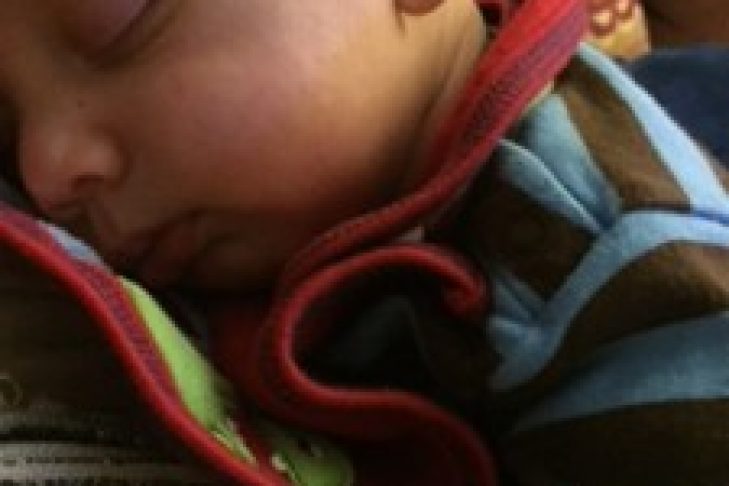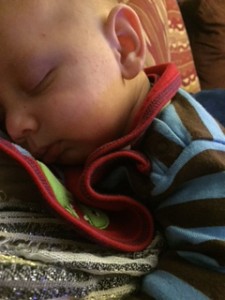I type this while holding a squirmy, feverish 3-month-old in my lap. Shh, shh, shh, I tell him. It’s OK, just relax and rest bubbeleh. I rub his back and pull him closer, patting his head, whispering, “Just lay your keppe down on mommy’s shoulder.”
He has no idea what I’m really saying, but the words must be soothing because slowly he’s settling down and snuggling in as I type with one hand. I can feel his stuffy nose breathing against my neck and my arm is falling asleep but I hesitate to lay him down, knowing he doesn’t feel good. I’m talking to him quietly, telling him maybe we will FaceTime with Bubbie and Gramps later after he rests. Go schluffy, I say. It will make you feel better. Let’s move this wet schmatte off your face (as he lays his head on a particularly drool-covered burp cloth) and you’ll feel better in a little while.
Suddenly I’m channeling all of my great-grandparents. Did I always throw this many Yiddish words into the middle of everyday conversations? Last time I checked, I’m a 40-year-old from New Jersey, living in Maine and I can’t speak conversational Hebrew, let alone Yiddish. In the last ten minutes, I used five Yiddish words and didn’t think twice about it. And apparently my older children, ages 7 and 9, have either never noticed, don’t care or they are just so used to hearing random Yiddish words they don’t know any different. My boyfriend who is not Jewish (and father of said 3-month-old), has never once questioned me as to what I’m talking about, and until recently, I never considered how weird some of the things I say must sound.
A Lutheran friend of mine (who recently revealed to me that she’s learned of some Jewish roots in her family and is doing research to learn more, and asks me questions as her resident Jewish friend), went in on a group gift for the baby. They had a custom onesie made for him with the word “tuchas” (which means butt) and an arrow on the behind, because she knew I’d find it funny. Of course I did chuckle, and a few weeks ago while sitting in the waiting room during my daughter’s cheer practice, it led to a whole conversation about Yiddish words. The “cheer moms” started quizzing me, looking up Yiddish on Google to see a. how much I really knew and b. how many words I actually use in conversation. In a room full of mostly straight-outta-Mainers, we all had a good laugh at the strangeness of it all, and the realization of how much Yiddish I use truly emerged.
Yet the strangeness has sat with me, making me feel even more different living in a place not known for diversity. I’ve caught myself changing my language to fit social situations, almost unconsciously. I’ve never been one to worry about “fitting in” as I’d rather just be me, but I’m coming to the realization that my version of being me incorporates my Jewishness as a given. So when I throw Yiddish into a conversation, I have this unrealistic expectation that the people I spend time with just get it. My reality doesn’t exactly match up in a world where the dying language of my ancestors has either become standard dialogue for the rest of the population (helllloooo Cawfee Tawk!), or a symbol of what connects me–and my children–to the past.
The baby is stirring, as he burps and spits up on my shoulder. Time to go clean up the schmutz, as I take solace in the words and pass on yet another tradition in my blended Jewish family.
Originally posted on InterfaithFamily.com.
This post has been contributed by a third party. The opinions, facts and any media content are presented solely by the author, and JewishBoston assumes no responsibility for them. Want to add your voice to the conversation? Publish your own post here. MORE


